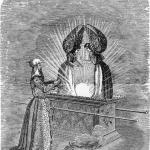
Edward Josiah Stearns (1810-1890) was an Episcopal clergyman from Maryland and author of several books. His volume, The Faith of Our Forefathers (New York: Thomas Whittaker, 1879), was a reply to The Faith of Our Fathers (1876), by James Cardinal Gibbons (1834-1921), one of the best and most well-known Catholic apologetics works, with an emphasis on scriptural arguments and replies to Protestant critiques of Catholicism. It had sold over 1.4 million copies by the time of its 83rd edition in 1917 and was the most popular book in the United States until Gone With the Wind was published in 1939. This volume highly influenced my own development as a soon-to-be Catholic apologist in the early 1990s: especially with regard to my usual modus operandi of focusing on “biblical evidence” for Catholicism.
The words of Rev. Stearns will be in blue. I use RSV for biblical citations.
***
It is hardly necessary to say that the Roman division of sins into mortal and venial, has no warrant in the Word of God. . . . there is no . . . passage that gives even the slightest countenance to the Roman distinction. All sin repented of, even the most aggravated, is venial; all sin unrepented of, even the least aggravated, is mortal. There is a difference in the punishment of slight and of heinous sins, but it is a difference of intensity, not of duration; sin repented of hath full and free forgiveness; sin unrepented of hath never forgiveness. (p. 224)
Once again, Rev. Stearns is grossly, scandalously unfamiliar with the Bible that Protestants as a matter of course assume they know and understand so much better than Catholics do.
Some non-Catholic Christians (like Rev. Stearns) think that all sins are exactly alike in the eyes of God: everything from a white lie or a child stealing a cookie to mass murder. They believe this not out of common sense, but because they erroneously think that the Bible teaches it. But this mistaken notion is decisively refuted by many biblical passages. Scripture states that there are differences in the seriousness of sin:
1 John 5:16-17 If any one sees his brother committing what is not a mortal sin, he will ask, and God will give him life for those whose sin is not mortal. There is sin which is mortal; I do not say that one is to pray for that. All wrongdoing is sin, but there is a sin which is not mortal.
James 1:14-15 but each person is tempted when he is lured and enticed by his own desire. [15] Then desire when it has conceived gives birth to sin; and sin when it is full-grown brings forth death. (cf. 5:20)
Matthew 5:22 But I say to you that every one who is angry with his brother shall be liable to judgment; whoever insults his brother shall be liable to the council, and whoever says, “You fool!” shall be liable to the hell of fire.
Matthew 12:32 And whoever says a word against the Son of man will be forgiven; but whoever speaks against the Holy Spirit will not be forgiven, either in this age or in the age to come. (cf. Lk 12:10)
John 19:11 . . . he who delivered me to you has the greater sin.
Romans 6:16, 23 . . . sin, which leads to death . . . [23] For the wages of sin is death, . . . (cf. 7:11)
The Bible also teaches about differences in subjective guiltiness of sin (which is one of the keys as to whether a sin is mortal or venial). People are not always completely aware that certain acts or thoughts are sinful. In Catholic theology, in order to commit a grave, or mortal sin, where one ceases to be in a state of grace and is literally in potential, but real danger of hellfire, three requirements are necessary: 1) it must be a very serious matter, 2) the sinner has to have sufficiently reflected on, or had adequate knowledge of the sin, and 3) he must have fully consented in his will.
The biblical and Catholic distinction is between “unwitting sin” or “error” committed by a person who “does not know” is distinguished from sin “with a high hand” (Num 15:30 below): done by person who “reviles the LORD”, and “has despised the word of the LORD”. This scenario is precisely analogous to the Catholic notion, insofar as the more serious sin caused the person to be “cut off” from the congregation of Israel: the usual OT concrete expression of what in Catholicism is understood in the spiritual sense as being cut off from God’s grace and communion with Him (and possibly from salvation and heaven in the long run).
Scripture provides many indications of this difference in seriousness of sin, and in subjective guiltiness for it:
Leviticus 5:17-18 “If any one sins, doing any of the things which the LORD has commanded not to be done, though he does not know it, yet he is guilty and shall bear his iniquity. [18] He shall bring to the priest a ram without blemish out of the flock, valued by you at the price for a guilt offering, and the priest shall make atonement for him for the error which he committed unwittingly, and he shall be forgiven.” (cf. 4:2, 13, 22, 27; Lev 5:15, 18; 22:14)
Numbers 15:27-31 “If one person sins unwittingly, he shall offer a female goat a year old for a sin offering. [28] And the priest shall make atonement before the LORD for the person who commits an error, when he sins unwittingly, to make atonement for him; and he shall be forgiven. [29] You shall have one law for him who does anything unwittingly, for him who is native among the people of Israel, and for the stranger who sojourns among them. [30] But the person who does anything with a high hand, whether he is native or a sojourner, reviles the LORD, and that person shall be cut off from among his people. [31] Because he has despised the word of the LORD, and has broken his commandment, that person shall be utterly cut off; his iniquity shall be upon him.” (cf. 15:24, 27-29; Josh 20:3, 5; Tobit 3:3)
These lesser, venial sins were “forgiven” (Lev 4:20, 26, 31, 35; 5:10, 16, 18; Num 15:25-26, 28) through the usual processes of priestly sacrifice and atonement, based on the Law of Moses.
Ezekiel 45:20 You shall do the same on the seventh day of the month for any one who has sinned through error or ignorance; . . .
Luke 12:47-48 And that servant who knew his master’s will, but did not make ready or act according to his will, shall receive a severe beating. But he who did not know, and did what deserved a beating, shall receive a light beating. Every one to whom much is given, of him will much be required; and of him to whom men commit much they will demand the more.
Luke 23:34 And Jesus said, “Father, forgive them; for they know not what they do.” . . .
John 9:41 Jesus said to them, “If you were blind, you would have no guilt; but now that you say, ‘We see,’ your guilt remains.”
Acts 3:17 And now, brethren, I know that you acted in ignorance, as did also your rulers.
Acts 17:30 The times of ignorance God overlooked, but now he commands all men everywhere to repent,
Romans 3:25 . . . This was to show God’s righteousness, because in his divine forbearance he had passed over former sins;
Romans 10:2-3 I bear them witness that they have a zeal for God, but it is not enlightened. [3] For, being ignorant of the righteousness that comes from God, and seeking to establish their own, they did not submit to God’s righteousness.
1 Timothy 1:13 though I formerly blasphemed and persecuted and insulted him; but I received mercy because I had acted ignorantly in unbelief.
Hebrews 10:26: For if we sin deliberately after receiving the knowledge of the truth, there no longer remains a sacrifice for sins,
James 3:1 Let not many of you become teachers, my brethren, for you know that we who teach shall be judged with greater strictness.
1 Peter 1:14 As obedient children, do not be conformed to the passions of your former ignorance,
And the Bible refers to (mortal) sins which — if not repented of — will exclude one from heaven:
Leviticus 18:26, 29 But you shall keep my statutes and my ordinances and do none of these abominations, . . . [29] For whoever shall do any of these abominations, the persons that do them shall be cut off from among their people.
Ezekiel 18:5-13 “If a man is righteous and does what is lawful and right — [6] if he does not eat upon the mountains or lift up his eyes to the idols of the house of Israel, does not defile his neighbor’s wife or approach a woman in her time of impurity, [7] does not oppress any one, but restores to the debtor his pledge, commits no robbery, gives his bread to the hungry and covers the naked with a garment, [8] does not lend at interest or take any increase, withholds his hand from iniquity, executes true justice between man and man, [9] walks in my statutes, and is careful to observe my ordinances — he is righteous, he shall surely live, says the Lord GOD. [10] “If he begets a son who is a robber, a shedder of blood, [11] who does none of these duties, but eats upon the mountains, defiles his neighbor’s wife, [12] oppresses the poor and needy, commits robbery, does not restore the pledge, lifts up his eyes to the idols, commits abomination, [13] lends at interest, and takes increase; shall he then live? He shall not live. He has done all these abominable things; he shall surely die; his blood shall be upon himself.
The prophet continues in the same vein in 18:14-23. This is not “one sin”; it’s a host of sins, a lifestyle: a life given over to wanton wickedness and unrighteousness. Then in 18:26 he reiterates: “When a righteous man turns away from his righteousness and commits iniquity, he shall die for it; for the iniquity which he has committed he shall die.” If that weren’t clear enough, he refers again to “all the transgressions” (18:28, 31) and “all your transgressions” (18:30).
Matthew 5:28-30 But I say to you that every one who looks at a woman lustfully has already committed adultery with her in his heart. [29] If your right eye causes you to sin, pluck it out and throw it away; it is better that you lose one of your members than that your whole body be thrown into hell. [30] And if your right hand causes you to sin, cut it off and throw it away; it is better that you lose one of your members than that your whole body go into hell. (cf. Mk 9:47-48)
Matthew 15:18-20 But what comes out of the mouth proceeds from the heart, and this defiles a man. [19] For out of the heart come evil thoughts, murder, adultery, fornication, theft, false witness, slander. [20] These are what defile a man; but to eat with unwashed hands does not defile a man.
1 Corinthians 6:9-10 Do you not know that the unrighteous will not inherit the kingdom of God? Do not be deceived; neither the immoral, nor idolaters, nor adulterers, nor sexual perverts, [10] nor thieves, nor the greedy, nor drunkards, nor revilers, nor robbers will inherit the kingdom of God.
Galatians 1:8 But even if we, or an angel from heaven, should preach to you a gospel contrary to that which we preached to you, let him be accursed.
Galatians 5:19-21 Now the works of the flesh are plain: fornication, impurity, licentiousness, [20] idolatry, sorcery, enmity, strife, jealousy, anger, selfishness, dissension, party spirit, [21] envy, drunkenness, carousing, and the like. I warn you, as I warned you before, that those who do such things shall not inherit the kingdom of God.
Ephesians 5:3-6 But fornication and all impurity or covetousness must not even be named among you, as is fitting among saints. [4] Let there be no filthiness, nor silly talk, nor levity, which are not fitting; but instead let there be thanksgiving. [5] Be sure of this, that no fornicator or impure man, or one who is covetous (that is, an idolater), has any inheritance in the kingdom of Christ and of God. [6] Let no one deceive you with empty words, for it is because of these things that the wrath of God comes upon the sons of disobedience.
Colossians 3:5-6 Put to death therefore what is earthly in you: fornication, impurity, passion, evil desire, and covetousness, which is idolatry. [6] On account of these the wrath of God is coming.
Revelation 21:8 But as for the cowardly, the faithless, the polluted, as for murderers, fornicators, sorcerers, idolaters, and all liars, their lot shall be in the lake that burns with fire and sulphur, which is the second death.
Revelation 22:15 Outside are the dogs and sorcerers and fornicators and murderers and idolaters, and every one who loves and practices falsehood.
Martin Luther, the founder of Protestantism, his successor Philip Melanchthon (in the Apology for the Augsburg Confession), and prominent early Lutheran theologian Martin Chemnitz, all maintained the distinction between mortal and venial sins.
*
***
*
Photo credit: The Woman Taken in Adultery (1620s) by Guercino (1591-1666) [public domain / picryl]
Summary: Anglican apologist Edward Josiah Stearns claimed there was “no” scriptural support at all for mortal and venial sins. I produced 31 passages and many cross-references as well.













